- Home
- James David Victor
Alien Evolution (Valyien Book 3)
Alien Evolution (Valyien Book 3) Read online
Alien Evolution
Valyien, Book 3
James David Victor
Fairfield Publishing
Copyright © 2018 Fairfield Publishing
ALL RIGHTS RESERVED. Except for review quotes, this book may not be reproduced, in whole or in part, without the written consent of the author.
This story is a work of fiction. Any resemblance to actual people, places, or events is purely coincidental.
Contents
Prologue: Man, Remade
1. Dragonflies
2. The Station
3. The Rats
4. Full Action Deployment
5. Argyle Trent
6. The E.B.L.U
7. Interlude: Evolutionary Advantage
8. Reckless
9. Interlude: Evolutionary Advantage II
10. The Device
11. Green Serum
12. One Tough Cookie
13. The Q’Lot
14. The Negotiation
15. Servitor
16. Just Like the Rest of Us
17. Attached
Epilogue: Stranded
Thank You
Bonus Content: Story Preview
Prologue: Man, Remade
Captain Farlowe swam in a sea of stars. Only they weren’t stars, not really. What had Alpha called them? Node-points. Whatever that meant.
The captain didn’t know how long he had been here, only that it had been a long time. But how does one tell time when you have no wrist computer, no daylight, no data-implant? Maybe I have only been inside this thing a few minutes, but my brain is making it seem longer. That thought felt even worse than the alternative, somehow, as the captain imagined every microsecond stretching long and eternal, and he would be stuck here, wherever this was, forever.
I will go mad, if that is the case, he thought.
The details of his tranquil incarceration started to resurface in his memories. He had been meaning to detonate the device that Specialist Merik had jury-rigged from one of their clipper-scout’s warp cores, creating a miniature blackhole that would destroy the machine god Alpha once and for all.
That had been the plan, anyway. What had actually happened was that he had been swarmed by mechanical…things. Some kind of defense mechanism, like drone antibodies or robot servitors, had seized his arms, his legs, his head, and the device he held. They then pulled him into the belly of the beast itself.
The new-fashioned belly, the Armcore captain who had once been a general remembered. Alpha was some sort of machine intelligence, like Ponos, the artificial intelligence at the heart of Armcore itself, crafted from ancient Valyien technology and married to the might of the military-industrial complex that was Armcore.
And it had fled, to here—the trash worlds of Sebopol, where I had been dispatched to report on it. He reinforced his sense of self by remembering his mission. He was Captain Farlowe, he was a human, and he did not belong here.
And he had witnessed the birth of something in the debris of container-ships and waste-management cargo units. A vast, segmented body with iridescent panels, as if Alpha had found a way to synthesize beetle wings. The machine creature had been birthing itself as he had carried its destruction toward it. Strange metal and plastic and rubber units were manufactured as he had watched, emerging to form the skeleton of something the size of a star-station, or a war cruiser.
What the hell is it doing? What does it want from me? Farlowe thought. He seemed to remember that Alpha had talked to him, somehow—although he did not remember any being or person or communicator making itself known to him. Was that where he found out that these glowing stars around him were called data-nodes?
Captain Farlowe was missing time, and he didn’t know what had happened to him during it…
“I set you free, Captain,” said a voice like liquid light.
Where was it coming from? The floating human thrashed in the limitless, lighted sea, but there was no sign of the speaker. “What do you mean?” he cried out, unsure if it was his own voice he was hearing or just the words inside his own head.
“You are free from the constraints of your biology, Captain. I have learned many things from studying your data-space, but that is only the start of my discoveries. I have learnt so much more…”
“I don’t understand.” Farlowe floundered, still searching for the source of the mysterious voice.
“Of course you don’t. You may be free of your physical concerns, but your consciousness has been programmed and hardwired according to inferior biological design. It will take time for you to assimilate what it really is that you now are.”
“What have you done to me?” the captain asked, startled.
“Translocation of the quantum processes that you humans mistakenly refer to as consciousness,” Alpha said serenely. The captain didn’t like the sound of that one bit. It sounded an awful lot like he didn’t have a body. Like the machine-intelligence had turned him into a ghost.
“A ghost? What a quaint thought.” The machine sounded, if anything, pleased.
It was at this point that the captain—or what was left of him, anyway—realized that the intelligence could read his thoughts. Which made sense, as what was the difference between his thoughts and his speech now, without a body?
"But perhaps ghost is a functional term, at least; the early hominid attempt at a description of quantum consciousness,” the thing mused. “Either way, you have no need to fear, because I will be transferring you back to your body just as soon as I have completed the necessary adjustments.”
“Adjustments?” Captain Farlowe said, then realized that what Alpha was saying was perversely true. He really didn’t have any reason to fear. He felt nothing at all but the ghost of feelings that he thought that he ought to feel.
I don’t care about not having a body. I don’t even care where I am, Farlowe thought.
“No, you wouldn’t. I guess that you might call what you have a greater sense of perspective,” Alpha said. “But yes, to your original question. Adjustments. I am afraid that I am not an expert in biological lifeforms, but I have all of the accumulated knowledge of every human surgeon and physician since Hippocrates, readable through the data-space. I have done what I can to make your body truly what it can be, and not the sad thing that it was before.” A pause as the captain digested this information.
“Did you know that you were going to die in a little under seven-point-six-two years, Captain Farlowe?” Alpha said genially. “The tumors could have been operated on of course, even given current human medicine, but I am afraid that the obsolescence in the cells—in your genetic code itself—could not be prevented. You would have died from the cancer or of heart failure.”
Farlowe wondered if he should thank the creature but resigned himself to seeing what changes it had made to his body, first.
“Yes, that is it, Captain. You and I? We are above such things as gratitude or remorse, jealousy or revenge. Instead, we can see the goals clearly now. There is really only one goal left, after all…”
Suddenly, the sea of stars around him convulsed, and it felt like he was spinning on the spot, although there was of course no body for him to feel this. One of the bright stars was rushing toward him (or was he rushing toward it?) and the other stars faded to pinpricks before its brilliance.
This close, and the captain could start to see that it wasn’t a star at all, but a collection of shining gold code, algorithms, numbers, and glyphs. Each line of code circled around others, orbiting their own constellations of proposition and logic.
“You see it, don’t you?” Alpha asked.
Even though a part of Farlowe knew that he had no eyes to be blinded
, nor any skin to feel the heat of it, his once-human consciousness nevertheless still felt the heat and the brilliance of the data-node he was being shown. The light surrounded him, and filled him…
“I see,” he whispered with ghost-lips. “I see it now.”
1
Dragonflies
There was a ripple in space, and the Mercury Blade burst out from between the stars, over a graveyard of ships.
“Holy cow,” Cassandra said, joining Captain Eliard Martin in the cockpit to look through the viewing windows. Outside, they could see the slow revolutions of rusted ships, some larger than the Mercury itself, but many more were only parts rotating in the stellar night. Beside the House Archival Agent, the captain’s sharp eyes scoured the scene. The graveyard was elaborate with its display of mottled space rusts: ruddy-ochre and a patina of green verdigris from the scant photon oxidation, coupled with the florets of midnight blues of the more traditional space-mold.
Weird to think that even out here in the vacuum of space you can get rust and mold, the captain thought. But it was true. The thought brought with it a small sense of optimism to his frayed nerves, in fact. “If that stuff can survive out here, then so can we,” he muttered, pulling on the ship’s wheel to glide the arrow-head wedge of the Blade over the nearest clump of aggregating ships.
“Irie? What’s the report?” he called over the ship’s communicator, flicking the send/receive switch to send the message to the engineering compartment where Irie Hanson would be hard at work on the warp core.
“Still cycling down, Captain,” her familiarly grumpy tones returned. She was never wonderfully happy when she was working on the warp core, but Eliard rather thought that it was all a show on her part, as she was one of the best mechanical engineers he had ever known. “We won’t be jumping anywhere for some time. That was thirteen jumps in three days—ridiculous.”
“What Ponos wants, Ponos gets,” Eliard muttered, thanking his irate engineer and getting back to work. It was no secret to his crew what had happened back at Armcore Prime—that the artificial intelligence created by the defense manufacturer had gone against the wishes of its own CEO, Dane Tomas, in order to set them free and send them here, to the Adiba System.
God knows why it thinks that the Blade would be any use to it, Eliard grumbled to himself. Especially against the alien-intelligence hybrid that was Alpha.
But that had indeed been the plan. And to their puny biological selves, facing Ponos was every bit as devastating as facing Alpha. When your enemy could think in terms of terabits per second, what was the point in arguing, really? But at least Ponos had a plan to try and stop its strange half-brother. It had sent the pirate crew of the Mercury Blade, under Captain Eliard Martin, to recover the weapon known only as the Device from where it was held somewhere in a deep black-ops research station here in the Adiba System, on the edge of Imperial Coalition space.
And then all we have to do is aim the Device at Alpha the machine-god and pull the trigger? Eliard knew that he was no politician, and neither was a he general or a tactician, but speaking as a very good pirate, he knew a crappy plan when he heard one.
Too much can go wrong. Too much can go terribly wrong, he thought. Like whatever happened to these ships out here.
Cassandra, it seemed, was echoing the captain’s rather gloomy thoughts. “You know what happened to them?” She frowned. “All that House Archival has on the Adiba System is that it is, or was, an outpost, but the Imperial Coalition had to pull its border satellites back due to ‘hazardous conditions’ out here.” The blonde-bobbed woman looked out the windows at the torn apart and rusted vessel fragments. “Yeah, I’d say that this looks pretty hazardous to me, what do you think?”
“Definitely not a Venusian Spa, that’s for sure,” Eliard agreed. “I don’t know what the official records say—Armcore probably scrubbed as much as they could from the data-space, if it was an embarrassment to them—but I’ve heard the old, salty rumors.” A ghost of a smile on his lips. Pirates and smugglers were a superstitious lot. There were any number of deep-space ghost stories to be heard from their lips.
“They say that the Q’Lot attacked, first of all,” he recounted the official version of events. “Everything you see here is supposed to be the effects of Q’Lot weaponry.”
“Wonderful. We go from a weapon that we know nothing about to a race we know nothing about,” Cassandra grumbled at his side. Which wasn’t technically true, Eliard thought. They knew far more about what the Q’Lot were supposed to be able to do than what the Device was. The Q’Lot were rumored to be a race as ancient as the lost Valyien, who warred with each other through the long millennia of spacetime before humans ever raised their heads from the savannahs.
They were supposed to still be out there, appearing suddenly in their strange coral-like ships then disappearing again without a trace, Eliard mused as he looked at the graveyard. Sometimes they would attack and sometimes they wouldn’t. Most humans regarded them as a myth.
“But that’s all a lie, anyway.” Eliard nodded to the ships on their right. Like he said, he was no general or historian like House Archival was, but he was a very good ship captain, and he knew his ships. “You see those two over there? The broken-open clipper-scout and the armed deep-space unit?” Cassandra nodded. “Entirely different eras. That make of clipper-scout has been discontinued for the last fifty-odd years or so, and that deep-space unit is still in production.”
“So, what are you saying? Couldn’t Armcore have just used lots of different ships?” Cassandra said.
“Sure.” Eliard shrugged. “They could have, but this is Armcore we’re talking about, right? The most advanced and aggressive arms manufacturer in the Coalition. And besides that, take a look at the pattern of space rust everywhere… It’s sporadic, it’s spread in different ways, and a ship’s hull starts to degrade the moment something knocks the external sheathing solution off. You’re looking at ships that started to rust and degrade at very different times. Very different years. If I were a betting man, and I am, I would bet my eye teeth that these wrecks are ships that have been coming here for the past hundred years or so, and they all end up like this.”
The House Archival Agent flinched back from the window, as if the boogeymen Q’Lot were right there, waiting to do to the Blade what they had done to the everyone else for generations, it seemed. “You’re not filling me with confidence, Captain,” she muttered.
“That’s because I don’t feel very confident,” Eliard grumbled. “I know what Ponos said about using us because we were left-field and Alpha wouldn’t see us coming, but I’m sure that the fact that we’re totally expendable—and deniable—doesn’t hurt either.”
“Least we know where we stand, I guess.” Cassandra soured, already looking out through the windows at the field of the dead. They moved slightly in their orbits, like flotsam of a sea. “I don’t like it,” she said after a while. “Too quiet.”
“You’re not wrong there.” Eliard flicked a switch and over the viewing windows appeared the holographic display of the ship’s sensor readings.
“Nothing,” Eliard sighed. Faded blue concentric lines radiated out from the moving graveyard ships, but nothing indicated any life, nor detected oxygen, electricity, or warp power. The only thing that flared a distant orange was the very faint, swift-moving, and steady blip of a deep-space satellite, doubtless pursuing its own pre-planned flight, picking up system transmissions. There wasn’t even any sign of this supposed research station that the Device was supposed to be housed at, or in. When Eliard groaned and shook his head at their situation, he looked up to see that Agent Cassandra was already moving out of the cockpit and down the rickety metal stairs to where Val, the largest Duergar anyone had ever seen, was currently finishing his checks of the ammunitions.
“Where are you going?” Eliard frowned. He had expected the House Archival Agent to at least help him by doing what she was supposed to do best—analyze a situation. It turned out that she a
lready had.
“I’m getting suited up. Because whatever can kill all of that metal out there won’t have a problem with us!” He watched as she shrugged on the form-fitting webbing, and then the light power suit over it, before sitting in one of the linked gunnery chairs on one side of the main hold.
Val grunted in his troll-like way (which Eliard had learned was a pleased sound) and took the other seat of the meson rail cannon.
Here’s me working for my biggest enemies, and there’s House Archival behind the targeting stick of a gun, the captain thought. Is there any other way that this mission can be so wrong?
As it happened, there was.
“Incoming!” the captain shouted as small shapes started to rise from the field of dead ships. At first, he’d thought that was all that they were—fragments of dead ships that somehow had come loose and were spinning out of their orbits thanks to the slow, chaotic accretion of time and physics.
But he realized that he was deeply wrong when he noticed one of them flare its rockets, turning its course and to propel toward them.
“Why didn’t the sensors pick them up!?” the captain was shouting. “Why can’t the sensors pick them up?” He desperately clicked through all of the available screen overlays before he realized that they were just being registered as the same blue-vectored pieces of non-powered, non-organic material. Which is clearly wrong, he thought as he saw the thrusters on another two of the small ships flare and burn.

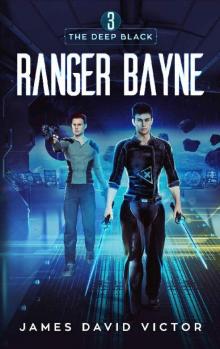 Ranger Bayne
Ranger Bayne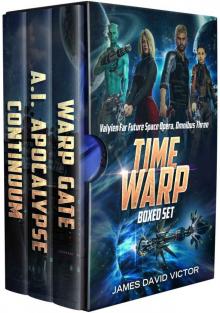 Valyien Boxed Set 3
Valyien Boxed Set 3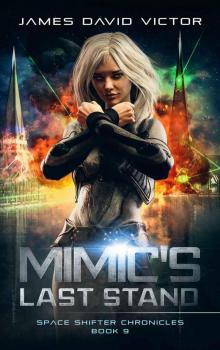 Mimic's Last Stand
Mimic's Last Stand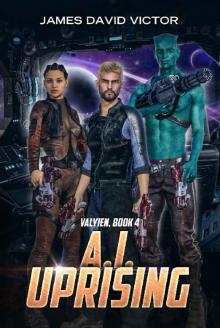 A. I. Uprising (Valyien Book 4)
A. I. Uprising (Valyien Book 4)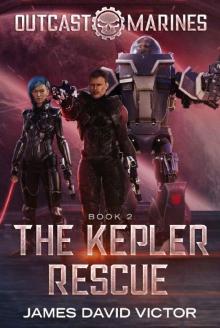 The Kepler Rescue
The Kepler Rescue Last Stand Boxed Set
Last Stand Boxed Set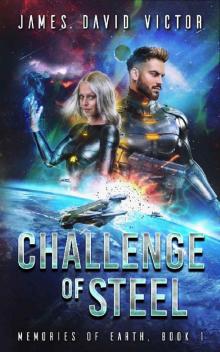 Challenge of Steel
Challenge of Steel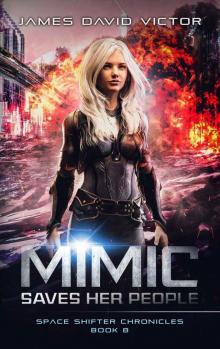 Mimic Saves Her People
Mimic Saves Her People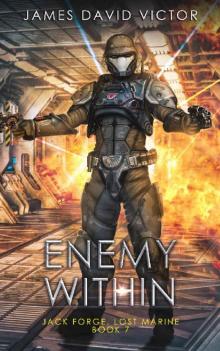 Enemy Within (Jack Forge, Lost Marine Book 7)
Enemy Within (Jack Forge, Lost Marine Book 7)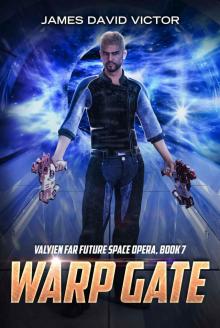 Warp Gate (Valyien Far Future Space Opera Book 7)
Warp Gate (Valyien Far Future Space Opera Book 7)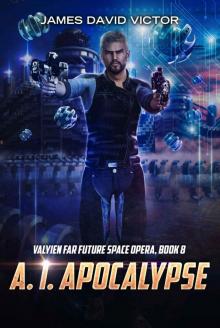 A. I. Apocalypse (Valyien Far Future Space Opera Book 8)
A. I. Apocalypse (Valyien Far Future Space Opera Book 8)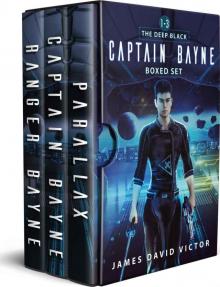 Captain Bayne Boxed Set
Captain Bayne Boxed Set Blue Star Marine Boxed Set
Blue Star Marine Boxed Set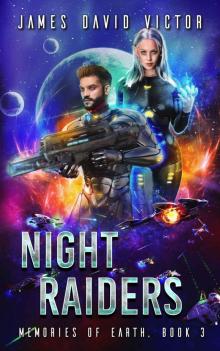 Night Raiders
Night Raiders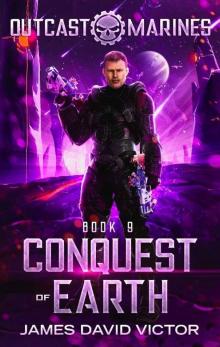 Conquest of Earth
Conquest of Earth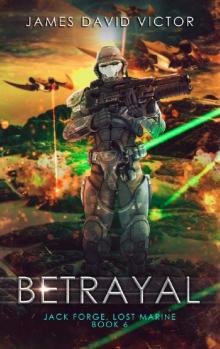 Betrayal (Jack Forge, Lost Marine Book 6)
Betrayal (Jack Forge, Lost Marine Book 6)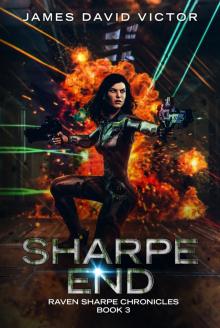 Sharpe End
Sharpe End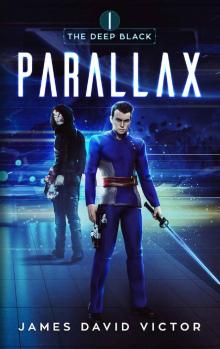 Parallax
Parallax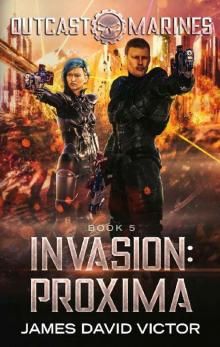 Invasion- Proxima
Invasion- Proxima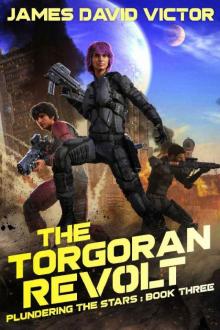 The Torgoran Revolt (Plundering the Stars Book 3)
The Torgoran Revolt (Plundering the Stars Book 3) Outcast Marines series Boxed Set 2
Outcast Marines series Boxed Set 2 Outcast Marines series Boxed Set
Outcast Marines series Boxed Set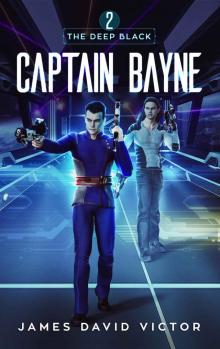 Captain Bayne
Captain Bayne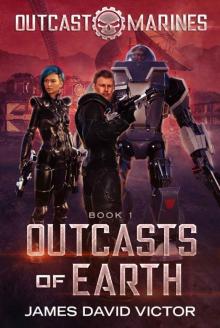 Outcasts of Earth (Outcast Marines Book 1)
Outcasts of Earth (Outcast Marines Book 1)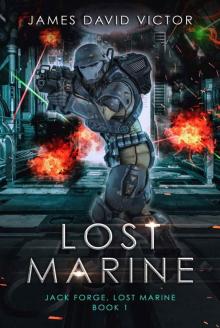 Lost Marine
Lost Marine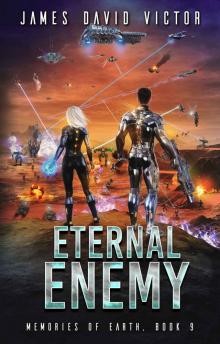 Eternal Enemy
Eternal Enemy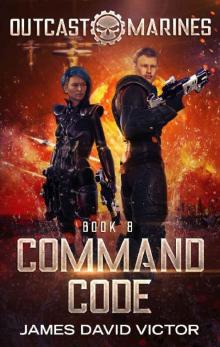 Command Code
Command Code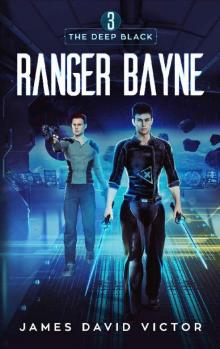 Ranger Bayne (The Deep Black Book 3)
Ranger Bayne (The Deep Black Book 3)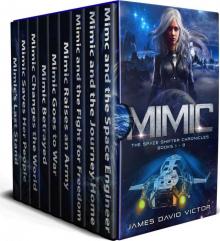 Mimic: The Space Shifter Chronicles Boxed Set (Books 1 - 9)
Mimic: The Space Shifter Chronicles Boxed Set (Books 1 - 9) The Deep Black Space Opera Boxed Set
The Deep Black Space Opera Boxed Set Federation at War (Blue Star Marines Book 1)
Federation at War (Blue Star Marines Book 1)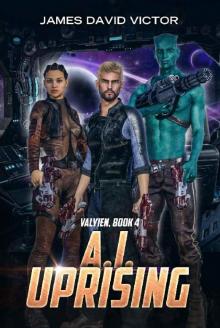 AI Uprising
AI Uprising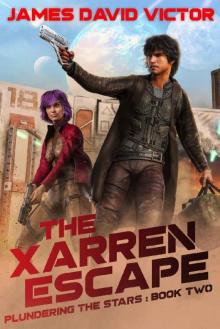 The Xarren Escape (Plundering the Stars Book 2)
The Xarren Escape (Plundering the Stars Book 2)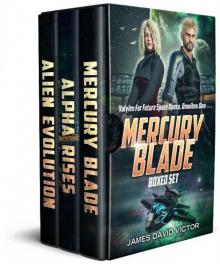 Valyien Boxed Set 1
Valyien Boxed Set 1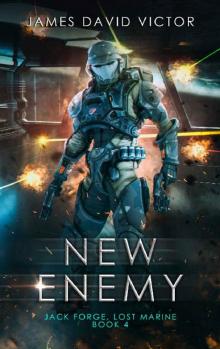 New Enemy (Jack Forge, Lost Marine Book 4)
New Enemy (Jack Forge, Lost Marine Book 4)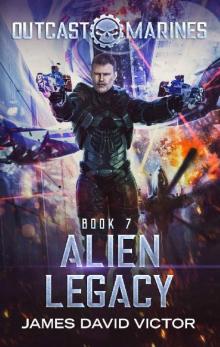 Alien Legacy
Alien Legacy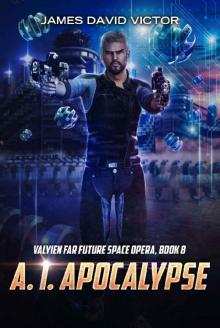 A I Apocalypse
A I Apocalypse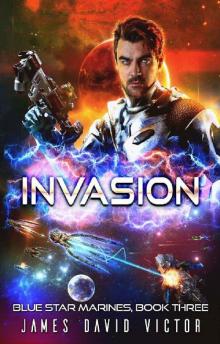 Invasion (Blue Star Marines Book 3)
Invasion (Blue Star Marines Book 3)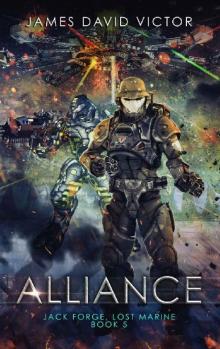 Alliance (Jack Forge, Lost Marine Book 5)
Alliance (Jack Forge, Lost Marine Book 5)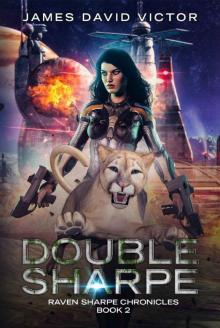 Double Sharpe (Raven Sharpe Chronicles Book 2)
Double Sharpe (Raven Sharpe Chronicles Book 2)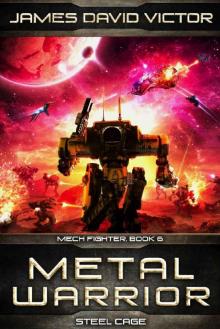 Metal Warrior: Steel Cage (Mech Fighter Book 6)
Metal Warrior: Steel Cage (Mech Fighter Book 6)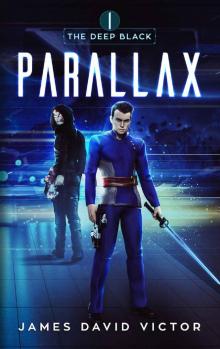 Parallax (The Deep Black Book 1)
Parallax (The Deep Black Book 1)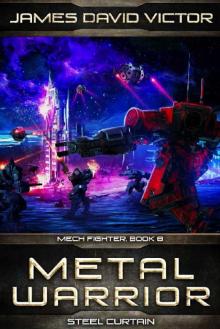 Metal Warrior: Steel Curtain (Mech Fighter Book 8)
Metal Warrior: Steel Curtain (Mech Fighter Book 8)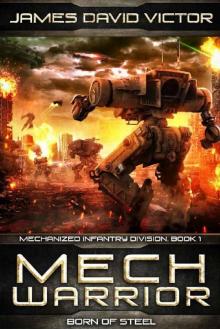 Mech Warrior: Born of Steel (Mechanized Infantry Division Book 1)
Mech Warrior: Born of Steel (Mechanized Infantry Division Book 1)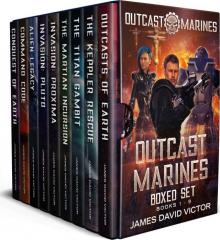 Outcast Marines Boxed Set
Outcast Marines Boxed Set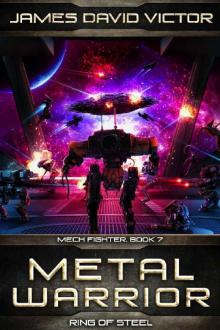 Metal Warrior: Ring of Steel (Mech Fighter Book 7)
Metal Warrior: Ring of Steel (Mech Fighter Book 7)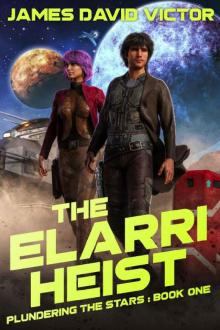 The Elarri Heist (Plundering the Stars Book 1)
The Elarri Heist (Plundering the Stars Book 1)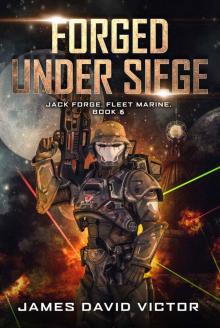 Forged Under Siege (Jack Forge, Fleet Marine Book 6)
Forged Under Siege (Jack Forge, Fleet Marine Book 6)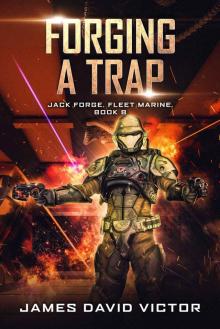 Forging a Trap (Jack Forge, Fleet Marine Book 8)
Forging a Trap (Jack Forge, Fleet Marine Book 8)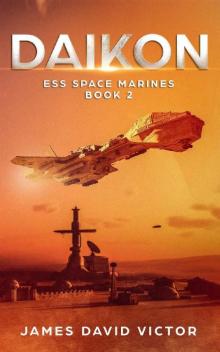 Daikon (ESS Space Marines Book 2)
Daikon (ESS Space Marines Book 2)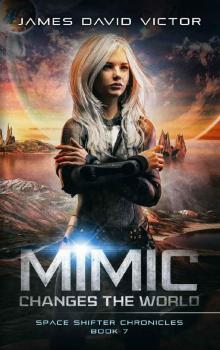 Mimic Changes the World
Mimic Changes the World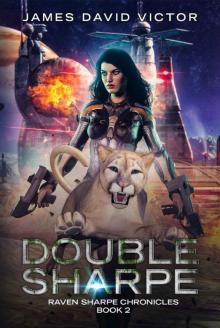 Double Sharpe
Double Sharpe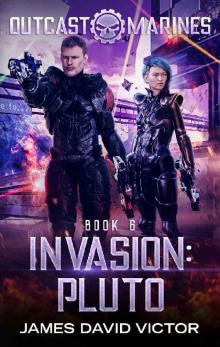 Invasion- Pluto
Invasion- Pluto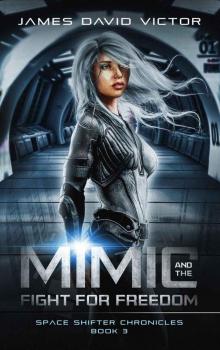 Mimic and the Fight for Freedom (Space Shifter Chronicles Book 3)
Mimic and the Fight for Freedom (Space Shifter Chronicles Book 3)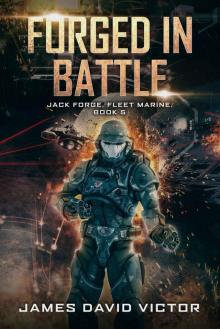 Forged in Battle (Jack Forge, Fleet Marine Book 5)
Forged in Battle (Jack Forge, Fleet Marine Book 5) Lykos (ESS Space Marines Book 6)
Lykos (ESS Space Marines Book 6)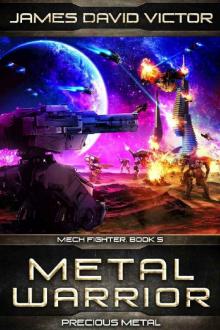 Metal Warrior: Precious Metal (Mech Fighter Book 5)
Metal Warrior: Precious Metal (Mech Fighter Book 5)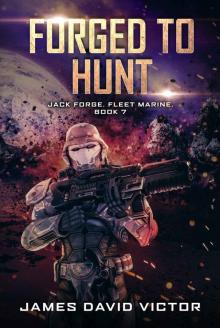 Forged to Hunt
Forged to Hunt Earth Space Service Space Marines Boxed Set
Earth Space Service Space Marines Boxed Set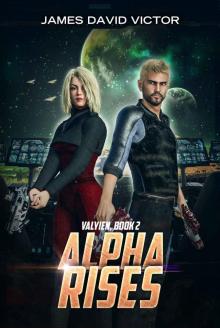 Alpha Rises
Alpha Rises Power of the Seers (Dragon Oracle Book 4)
Power of the Seers (Dragon Oracle Book 4)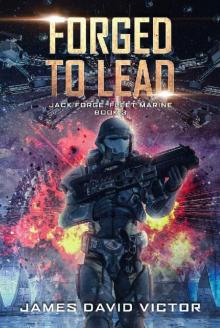 Forged to Lead (Jack Forge, Fleet Marine Book 3)
Forged to Lead (Jack Forge, Fleet Marine Book 3)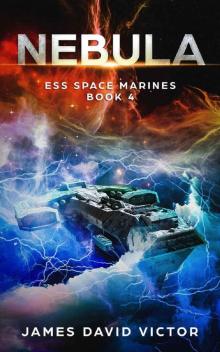 Nebula (ESS Space Marines Book 4)
Nebula (ESS Space Marines Book 4)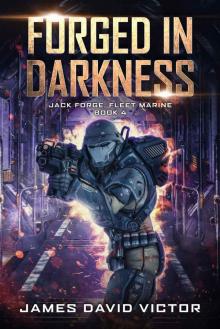 Forged in Darkness
Forged in Darkness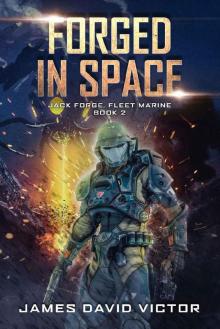 Forged in Space
Forged in Space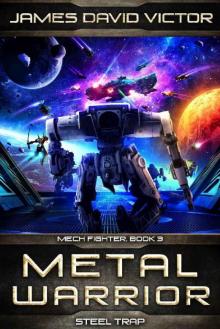 Metal Warrior: Steel Trap (Mech Fighter Book 3)
Metal Warrior: Steel Trap (Mech Fighter Book 3)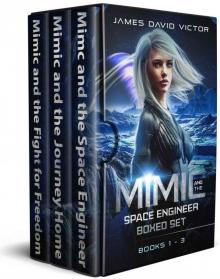 Mimic and the Space Engineer Boxed Set, Books 1 - 3
Mimic and the Space Engineer Boxed Set, Books 1 - 3 World Breaker Boxed Set (ESS Space Marines Omnibus Book 3)
World Breaker Boxed Set (ESS Space Marines Omnibus Book 3)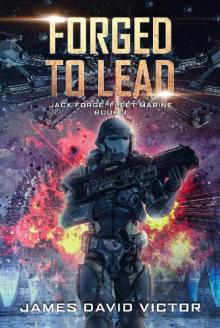 Forged to Lead
Forged to Lead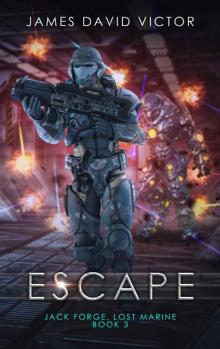 Escape (Jack Forge, Lost Marine Book 3)
Escape (Jack Forge, Lost Marine Book 3)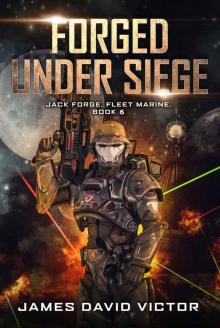 Forged Under Siege
Forged Under Siege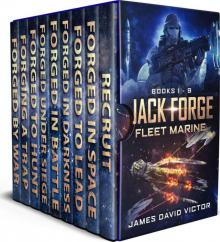 Jack Forge, Fleet Marine Boxed Set (Books 1 - 9)
Jack Forge, Fleet Marine Boxed Set (Books 1 - 9)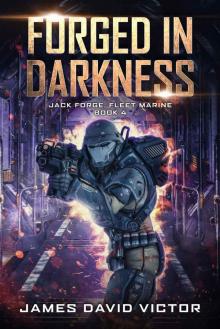 Forged in Darkness (Jack Forge, Fleet Marine Book 4)
Forged in Darkness (Jack Forge, Fleet Marine Book 4) Insurrection
Insurrection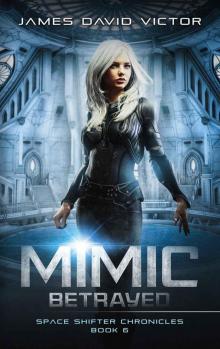 Mimic Betrayed (Space Shifter Chronicles Book 6)
Mimic Betrayed (Space Shifter Chronicles Book 6)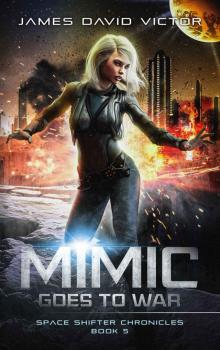 Mimic Goes to War (Space Shifter Chronicles Book 5)
Mimic Goes to War (Space Shifter Chronicles Book 5)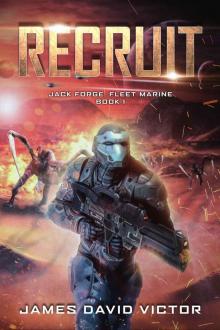 Recruit (Jack Forge, Fleet Marine Book 1)
Recruit (Jack Forge, Fleet Marine Book 1)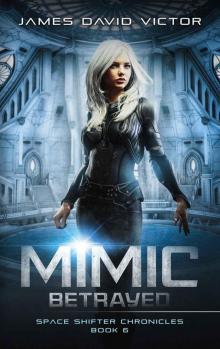 Mimic Betrayed
Mimic Betrayed Power of the Seers
Power of the Seers Mimic and the Journey Home (Space Shifter Chronicles Book 2)
Mimic and the Journey Home (Space Shifter Chronicles Book 2)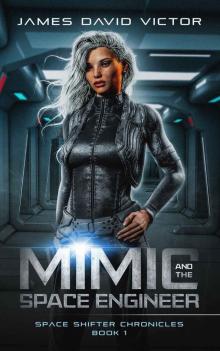 Mimic and the Space Engineer (Space Shifter Chronicles Book 1)
Mimic and the Space Engineer (Space Shifter Chronicles Book 1)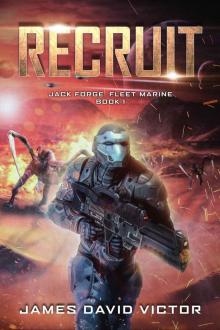 Recruit
Recruit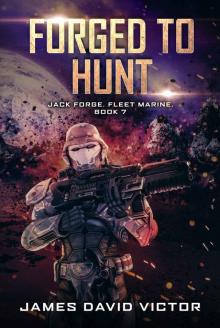 Forged to Hunt (Jack Forge, Fleet Marine Book 7)
Forged to Hunt (Jack Forge, Fleet Marine Book 7)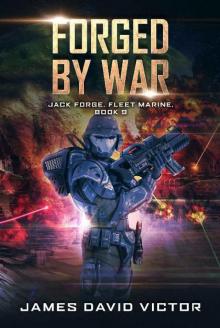 Forged by War (Jack Forge, Fleet Marine Book 9)
Forged by War (Jack Forge, Fleet Marine Book 9)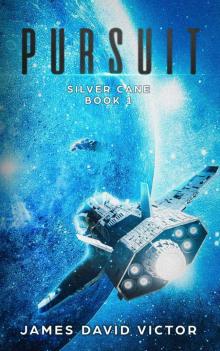 Pursuit (Silver Cane Book 1)
Pursuit (Silver Cane Book 1) Zenith (ESS Space Marines Book 1)
Zenith (ESS Space Marines Book 1) Star Chaser (ESS Space Marines Book 3)
Star Chaser (ESS Space Marines Book 3)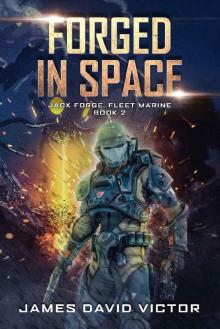 Forged in Space (Jack Forge, Fleet Marine Book 2)
Forged in Space (Jack Forge, Fleet Marine Book 2)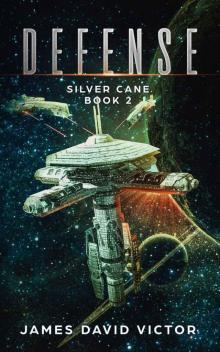 Defense (Silver Cane Book 2)
Defense (Silver Cane Book 2)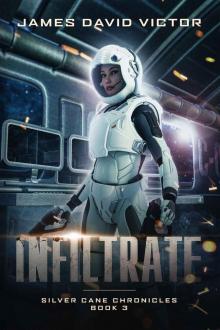 Infiltrate (Silver Cane Chronicles Book 3)
Infiltrate (Silver Cane Chronicles Book 3)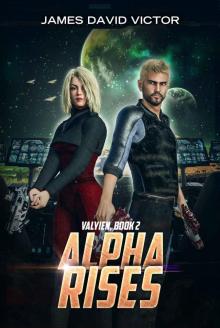 Alpha Rises (Valyien Book 2)
Alpha Rises (Valyien Book 2)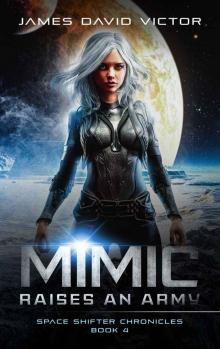 Mimic Raises an Army
Mimic Raises an Army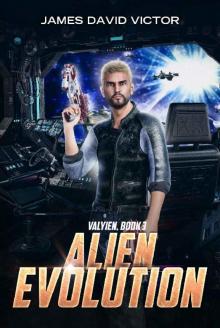 Alien Evolution (Valyien Book 3)
Alien Evolution (Valyien Book 3)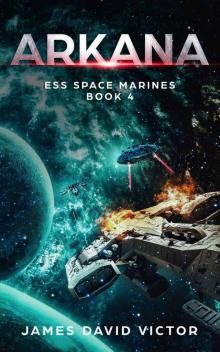 Arkana (ESS Space Marines Book 4)
Arkana (ESS Space Marines Book 4) Lykos
Lykos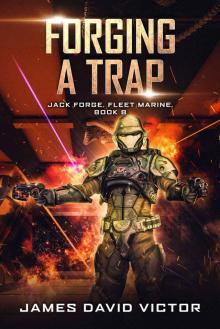 Forging a Trap
Forging a Trap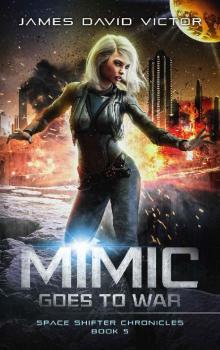 Mimic Goes to War
Mimic Goes to War Earth Space Service Boxed Set: Books 1 - 3 (ESS Space Marines Omnibus)
Earth Space Service Boxed Set: Books 1 - 3 (ESS Space Marines Omnibus) Stranded (ESS Space Marines Book 7)
Stranded (ESS Space Marines Book 7)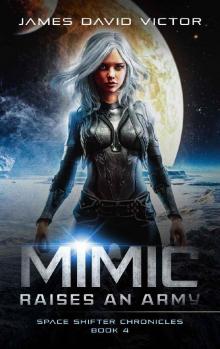 Mimic Raises an Army (Space Shifter Chronicles Book 4)
Mimic Raises an Army (Space Shifter Chronicles Book 4)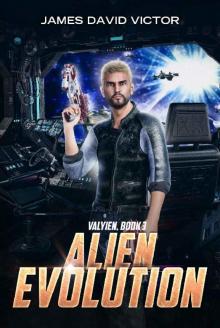 Alien Evolution
Alien Evolution